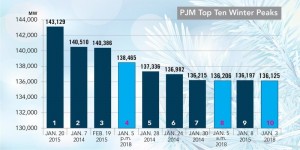
Last week's cold snap brought three of PJM Interconnection’s top 10 highest winter peak demands for electricity
From PJM Interconnection, January 09, 2018
VALLEY FORGE, Pa., Jan. 9, 2018 /PRNewswire/ — The cold weather from Dec. 27, 2017 through Jan. 7, 2018, brought three of PJM Interconnection’s top 10 highest winter peak demands for electricity. The grid operator credits planning and lessons learned implemented from the Polar Vortex for system resilience during this season’s first cold snap.
“After the Polar Vortex [of 2014], PJM worked with our members to better prepare to meet the demands of the system in cold weather,” said Mike Bryson, vice president – Operations. “We implemented the Capacity Performance construct’s strict standards for resources, strengthened communications with gas pipelines and improved preparation coordination with members. Member companies also made modifications to improve equipment performance. In the end, we saw better availability of resources during the extreme cold.”
Bryson said that PJM worked with members on cold weather preparedness, a fuel inventory survey, resource testing and a drill for emergency procedures. The cold weather exercises allow units to identify and correct start-up, operational and fuel switching issues prior to cold weather operations. PJM will continue to work with its members, he said, to improve reliable operations.
Generators qualifying as Capacity Performance resources must be ready to deliver electricity in a PJM power supply emergency. Generators must have firm fuel supplies or be able to switch to a secondary fuel or fuel source.
Friday evening, Jan. 5, PJM recorded its fourth-highest wintertime peak demand for electricity. At 7 p.m. (eastern) Friday, demand for electricity reached 138,465 megawatts. The other two top 10 winter peak demands were 136,206 MW on the morning of Jan. 5 (eighth highest) and 136,125 MW on Jan. 3 (10th highest).
During the run of 11 days, the average RTO-wide temperature did not reach as high as 20 degrees. The average low temperature was 2.9 degrees on Jan. 1, 2018.
Each year, PJM analyzes the expected demand for electricity, weather predictions and other factors to develop its forecast for the season’s operations.
Among the factors PJM looked at this year was a southward shift in the polar vortex that caused unusually cool weather in August of 2017. That shift indicated a risk of periods of arctic cold through the winter of 2017-2018.
PJM Interconnection, founded in 1927, ensures the reliability of the high-voltage electric power system serving 65 million people in all or parts of Delaware, Illinois, Indiana, Kentucky, Maryland, Michigan, New Jersey, North Carolina, Ohio, Pennsylvania, Tennessee, Virginia, West Virginia and the District of Columbia. PJM coordinates and directs the operation of the region’s transmission grid, which includes over 82,000 miles of transmission lines; administers a competitive wholesale electricity market; and plans regional transmission expansion improvements to maintain grid reliability and relieve congestion. PJM’s regional grid and market operations produce annual savings of $2.8 billion to $3.1 billion. For the latest news about PJM, visit PJM Inside Lines at insidelines.pjm.com
SOURCE PJM Interconnection, http://www.pjm.com
